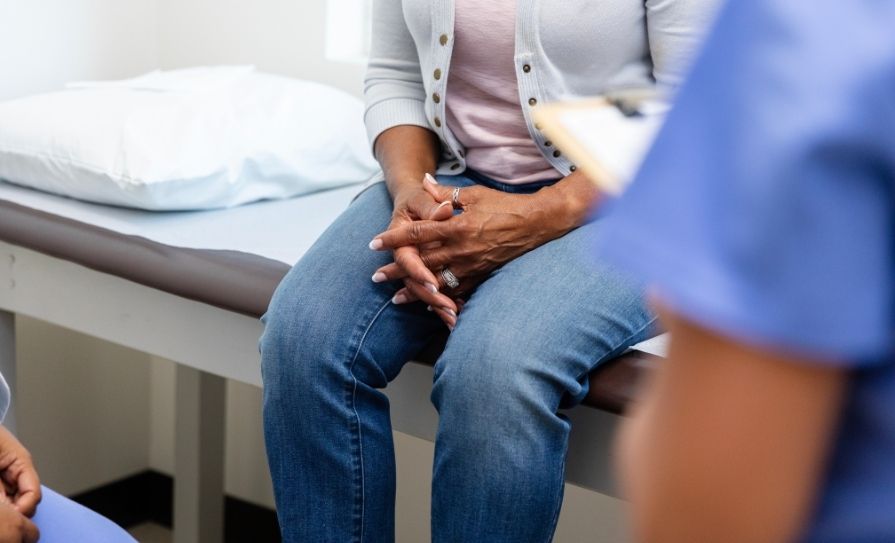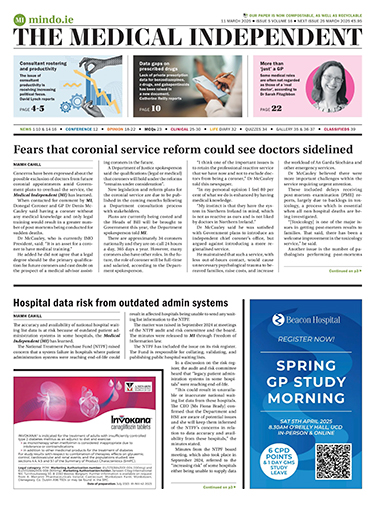The Rotunda Hospital is leading an initiative that will provide streamlined gynaecology care in north Dublin. Catherine Reilly spoke to the Rotunda Master Prof Sean Daly about the plans
The Rotunda Hospital is spearheading the development of a centralised referral and triage system for ‘benign gynaecology’ in north Dublin.
The project – called the North Dublin Women’s Health Initiative – aims to ensure streamlined care pathways and adequate capacity to meet women’s healthcare needs.
Hospital-level care for ‘benign gynaecology’ in the area is also provided at Beaumont Hospital in Dublin 9; and Connolly Hospital in Blanchardstown. It is common for GPs to make the same referral to more than one of the three hospitals.
Initiative
Under the planned initiative, which is still in development, the Rotunda will receive all GP referrals for ‘benign gynaecology’ for north Dublin. These will be assessed by a consultant gynaecologist to determine the most appropriate care pathway for the patient.
This assessment will consider whether the patient should see a specific consultant and if imaging or other interventions are required prior to scheduling a consultant appointment.
The Rotunda has submitted a detailed proposal to the HSE for additional resources. It is expected the hospital will establish service level agreements with Connolly and Beaumont to underpin this initiative.
Currently, four consultant gynaecologists work in Connolly (equating to less than one whole-time equivalent in total) and two in Beaumont (one whole-time equivalent in total) and all of these consultants are also contracted to the Rotunda.
In recent months, the Rotunda accepted a cohort of long-waiting patients from Beaumont. One of the aims was to understand the type of gynaecology referrals it received. About 30 per cent were internal referrals (eg, women who presented to Beaumont’s emergency department or had been referred from other services such as gastroenterology).
These types of referrals will not be incorporated into the centralised gynaecology system.
Women who may be referred to Beaumont under the centralised system include those with complex co-morbidities due to the hospital’s status as a model four adult facility.

Speaking to the Medical Independent (MI), Master of the Rotunda Prof Sean Daly noted: “The two consultants who work in Beaumont are experts in minimally invasive surgery. So things like endometriosis which may require the support of a general surgeon if the endometriosis is stage four – it is those types of [cases] we will direct towards Beaumont, for example.”
According to Prof Daly, gaining access to theatre is a challenge for all of the hospitals. He added that a potential future option may be the theatre department in Temple Street when the New Children’s Hospital is opened. “There is, as I understand it, five very nice operating theatres there. If the Rotunda could get one of those for a day or two a week that would be hugely beneficial to us and it is literally up the road.”
The Rotunda has four operating theatres, but there is limited access for gynaecology. The hospital is delivering more than 8,500 babies annually and 40 per cent are delivered by Caesarean section. Births at the hospital have been increasing and exceed those in each of the two other Dublin maternity hospitals.
Developing services
Prof Daly emphasised the need to develop non-oncological gynaecology services for women in the north Dublin region. Given the Rotunda’s obstetrical workload and infrastructural limitations, this would be “a real challenge… but one we are up for”.
A project manager has been recruited to lead the development of the North Dublin Women’s Health Initiative. Speaking to MI in August, Prof Daly said he hoped the system will be “well established” by the end of the year.
The Rotunda has the busiest gynaecology unit in the country, Prof Daly told MI. Prior to the Covid-19 pandemic it was receiving approximately 650 referrals per month. This has now increased to around 1,000.
He said the Rotunda is asking GPs to indicate the primary symptom with which the patient presented, in order to determine the most appropriate care pathway.
“We are looking to streamline the way we offer care to these women in order to make the system more efficient. Efficiency really is about caring for women in a timely and appropriate way.”
The Rotunda will also be writing to GPs who refer patients from outside the “catchment area” to advise that referrals should be sent to the local unit for standard gynaecology care. This would not apply to gynaecology services at the Rotunda that have a national remit.
The precise catchment area for the Rotunda is somewhat nebulous. Prof Daly said it stretches from Balbriggan across to Dunshaughlin and down to Dublin city. He added that the inclusion of the entire city is “a little bit controversial” as there are also “very good gynaecology units” on the southside.
Currently, there are over 4,000 women on the Rotunda’s gynaecology outpatient waiting lists. All referrals are triaged and those suspicious for cancer are designated as the most urgent. “Primarily those would be women presenting with post-menopausal bleeding and they are all seen very quickly,” stated Prof Daly.
There are four areas in which women may be waiting more than nine months: Urogynaecology; complex menopause; infertility; and outpatient hysteroscopy. The Rotunda has been scheduling extra clinics out-of-hours and on Saturdays to reduce waiting lists.
“We are really at breaking point in terms of our ability to schedule clinics within our gynaecology outpatient clinical department,” Prof Daly told MI.
The HSE has bought over 24,000 square feet on Dominick Street Lower from Dublin City Council for the Rotunda’s use. This will facilitate most gynaecology outpatients’ activity and will also include physiotherapy, early pregnancy assessment, and teaching facilities. It is hoped patients will be seen in the Dominick Street premises by the end of 2025.
“That [space] will allow us to do a lot more outpatient gynaecology clinics, because there is only a certain amount we can do week on week,” said Prof Daly.
Prof Daly considers that two additional gynaecology consultants would be sufficient to address outpatient referrals.
The Rotunda is also planning to develop a gynaecology day ward with protected beds. The hospital has 196 beds in total and Prof Daly described bed capacity as a “huge issue”. He noted, by comparison, just over 240 beds are included in the plans for the new National Maternity Hospital.
He said approximately two-thirds of women who access gynaecology outpatients will need operative care as part of their treatment at some stage.
“We need to try and clear the waiting list and then we need to put in place sufficient capacity to deal with the referrals that are coming through. A big part of clearing the waiting list will be getting access to operating theatres,” explained Prof Daly.
“We have put in a proposal to the [HSE] National Women and Infants Health Programme (NWIHP) to try and get access to some private facilities in order to allow us clear our waiting list….” If this can be achieved, the additional space on Dominick Street should provide sufficient capacity to address referrals, stated Prof Daly.
A HSE spokesperson said the NWIHP is engaging with the Rotunda on these proposals.
“The NWIHP is very supportive of this initiative, which envisages the centralisation of referrals received from GPs in relation to women requiring hospital level gynaecology review and care.
“This proposed approach would support women being directed to the most appropriate care based on their referral, for example, ambulatory gynaecology, complex menopause or fertility or the general gynaecology outpatient department.
“It would further enable care to be provided in a more timely and appropriate manner with gynaecology services and resources being coordinated, managed, and networked to support maximum capacity and throughput in the north Dublin region.”
Consideration will be given to “further steps that may be required” to address waiting lists and ensure capacity to achieve and maintain Sláintecare targets.
The NWIHP is also targeting the development of a new ambulatory gynaecology service in Connolly Hospital and is seeking to extend access to specialist women’s health physiotherapy services in the north Dublin region.













Leave a Reply
You must be logged in to post a comment.